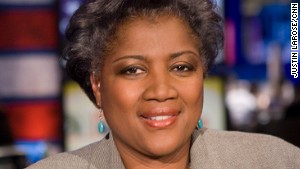STORY HIGHLIGHTS
- According to Nielsen data, 46% of the Super Bowl viewing audience is female
- Is it the spectacle of the battle or a chance to spend time with the family?
- Advertisers now know the audience, and cater to the female viewer
Editor's note: Donna
Brazile, a CNN contributor and a Democratic strategist, is vice
chairwoman for voter registration and participation at the Democratic
National Committee. She is a nationally syndicated columnist, an adjunct
professor at Georgetown University and author of "Cooking With Grease: Stirring the Pots in America." She was manager for the Gore-Lieberman presidential campaign in 2000.
(CNN) -- The NFL markets the Super Bowl as the
ultimate game, the ultimate contest. Helmets clash like gladiators in
ancient Rome. Stadiums resemble coliseums -- especially those without a
roof. The contest is macho all the way. Players talk about "manning up"
(not a reference to the quarterback family) and other
testosterone-leaning terms.
Other than a few
party-oriented commercials, football is marketed toward men. It's a guy
thing, and we ladies are allowed in if we know either when to cheer or
how to bring the cheer.
Or so the stereotype goes. So it used to be. But no more.
According to Nielsen
demographic data, 46% of the Super Bowl viewing audience is female, and
more women watch the game than the Oscars, Grammys and Emmys combined.

Donna Brazile
That perhaps surprising statistic raises two questions: Why? And, so what?
Why do women watch the
game? Now, we know that women attended the gladiator fights and chariot
races in ancient Rome. But today, it may be more than just the blood
sport.
Many women are into
sports for the same reasons men are: They enjoy the competition. It's
entertaining. The tailgating before. The excitement during. The
celebrating (or commiserating) after. Lots of action.
But a lot of women are
football fans because it's a family thing. My father was a lifelong
Saints fan, and I'm proud to carry on the family tradition. Lionel
Brazile has got to be beaming, knowing I'm going to my second Super
Bowl. He would have loved to hear my stories. Maybe I'll tell him one or
two while I'm praying.
There are lots of
studies about the different ways men and women bond, so I find it
interesting how the bonding intersects around Super Bowl time. For
women, the score is important if our team is playing. But whether we're
watching at home or at the stadium, it's about being there and being
with -- family and friends. For the men, it's also about sharing -- but I
suspect it's about sharing the competition, vicariously.
But as long as it's a good game, and brings people together for a positive experience, it doesn't matter why.
There is a "so what," though -- a practical economic side to women's interest in The Big Game. She-conomy.com reports that "women influence the majority of consumer spending across all categories."
 'SNL' mocks Super Bowl halftime show
'SNL' mocks Super Bowl halftime show
 Christie booed at Super Bowl event
Christie booed at Super Bowl event
 Black Hawk over the Super Bowl
Black Hawk over the Super Bowl
For advertisers and
businesses, Super Bowl Sunday should be a prime time to focus on women.
Sadly, according to a recent article in adweek.com, advertisers have fumbled the ball.
"In 2013 we saw
waitresses turned strippers, scantily clad women tackling each other in
the dirt, and a supermodel sloppily kissing a computer programmer," said
writer Kat Gordon.
This turns off men as well as women.
So if businesses want
their Super Bowl commercials to be part of the event, instead of an
excuse to check the fridge, they'd better pay attention to the numbers
-- and I don't mean the Roman numerals.
And while they are at
it, they should seriously consider taking it one step further and using
the Super Bowl -- the most watched sports event of the year -- to
promote awareness around issues facing women today.
Use this
testosterone-saturated event, for instance, to make clear that while
testosterone-driven violence might be entertaining on the field, it
doesn't belong in the bedroom.
Use the Super Bowl to do
more than determine the best football team of the year. Use it to help
end one of the most prevalent crimes of the century -- violence again
women. Use it as a warm-up for the One Billion Rising event on February 14, in which more than a billion people worldwide will rise to support justice for women.


0 التعليقات:
إرسال تعليق